英语 不规则动词时态变化表
动词不规则变化表
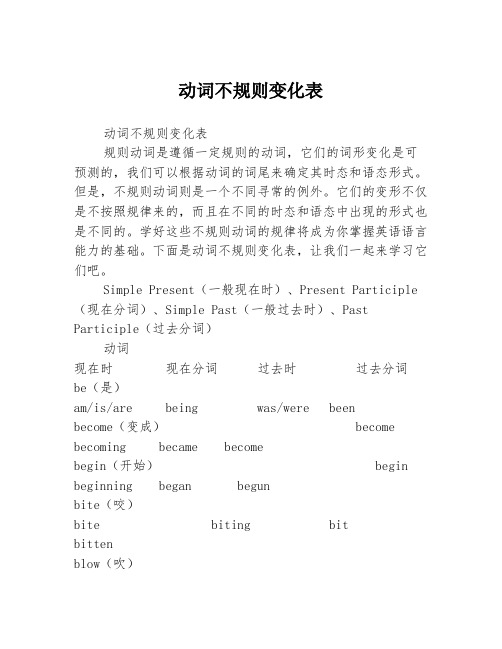
动词不规则变化表动词不规则变化表规则动词是遵循一定规则的动词,它们的词形变化是可预测的,我们可以根据动词的词尾来确定其时态和语态形式。
但是,不规则动词则是一个不同寻常的例外。
它们的变形不仅是不按照规律来的,而且在不同的时态和语态中出现的形式也是不同的。
学好这些不规则动词的规律将成为你掌握英语语言能力的基础。
下面是动词不规则变化表,让我们一起来学习它们吧。
Simple Present(一般现在时)、Present Participle(现在分词)、Simple Past(一般过去时)、PastParticiple(过去分词)动词现在时现在分词过去时过去分词be(是)am/is/are being was/were beenbecome(变成) become becoming became becomebegin(开始) begin beginning began begunbite(咬)bite biting bitbittenblow(吹)blow blowing blew blownbreak(打破) break breaking broke brokenbring(带来) bring bringing brought broughtbuild (建造) build building built builtbuy(购买)buy buying boughtboughtcatch(捕捉) catch catching caught caughtchoose(选择) choose choosing chose chosencome(来) come coming came comecost(花费)cost costing costcostcut(切割)cut cutting cutcutdig(挖)dig digging dugdugdo(做)do doing diddonedraw(画)draw drawing drew drawndrive(驾驶) drive driving drove driveneat(吃)eat eating ateeatenfall(落下)fall falling fellfallenfeed(喂养)feed feeding fedfedfeel(感觉)feel feeling feltfeltfight(战斗)fight fighting foughtfoughtfind(发现)find finding found foundfly(飞行)fly flying flewflownforget(忘记)forget forgetting forgotforgottenforgive(原谅)forgive forgiving forgaveforgivenget(得到)get getting gotgot(或gotten)give(给予)give giving gave givengo(去)go going went gonegrow(成长)grow growing grew grown hang(悬挂)hang hanging hung hung have(拥有)have having hadhadhear(听到)hear hearing heard heard hide(隐藏)hide hiding hid hiddenhit(击打)hit hitting hithold(握住)hold holding heldheldhurt(受伤)hurt hurting hurthurtkeep(保持)keep keeping kept kept know(知道)know knowing knew knownlay(放置)lay laying laidlaidlead(领导)lead leading led led learn(学习)learn learning learned(或learnt)learned(或learnt)leave(留下)leave leaving leftleftlet(让)let letting let letlie(躺)lie lying laylight(点燃)light lighting lit(或lighted)lit(或lighted)lose(失去)lose losing lostlostmake(制造)make making made mademean(意味着) mean meaning meant meantmeet(遇见)meet meeting met metpay(支付)pay paying paidpaidput(放置)put putting putputread(读取)read reading read readride(骑行)ride riding roderiddenring(响起)ring ringing rangrungrise(上升)rise rising rose risenrun(跑)run running ranrunsay(说)say saying said saidsee(看到)see seeing sawseensell(卖出)sell selling sold soldsend(发送)send sending sent sent set(设置)set setting set setshake(摇动)shake shaking shook shaken shine(发光)shine shining shone shone(或shined)show(展示)show showing showed shown(或showed)shut(关闭)shut shutting shut shut sing(唱歌)sing singing sang sung sink(沉没)sink sinking sank sunk sit(坐)sit sitting sat satsleep(睡觉)sleep sleeping sleptsleptspeak(讲话)speak speaking spoke spoken spend(花费)spend spending spent spent stand(站)stand standing stood stood swim(游泳)swim swimming swam swum take(带走)take taking took takenteach(教授)teach teaching taughttaughttell(告诉)tell telling told toldthink(思考)think thinking thought thought throw(扔掉)throw throwing threw thrown understand(理解) understand understanding understood understoodwake(唤醒)wake waking woke woken wear(穿着)wear wearing wore wornwin(获胜)win winning won wonwrite(写作)write writing wrotewritten动词不规则变化表希望能够帮助大家。
100个最常用英语不规则动词的过去时态
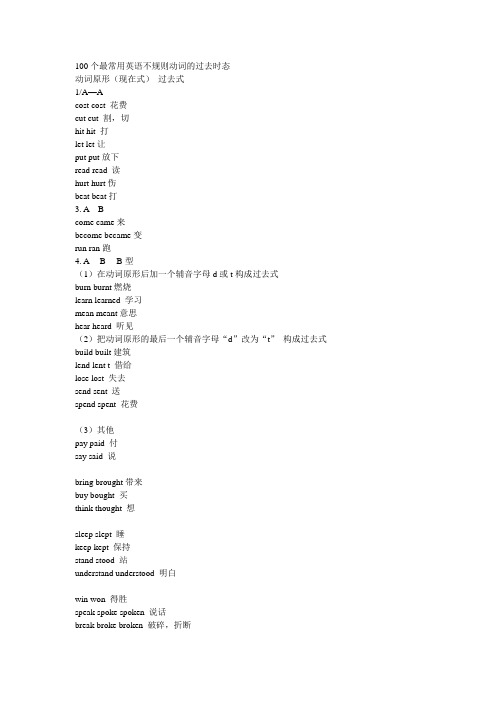
100个最常用英语不规则动词的过去时态动词原形(现在式)过去式1/A—Acost cost 花费cut cut 割,切hit hit 打let let让put put放下read read 读hurt hurt伤beat beat打3. A---B--come came来become became变run ran跑4. A ---B ---B型(1)在动词原形后加一个辅音字母d或t构成过去式burn burnt燃烧learn learned 学习mean meant意思hear heard 听见(2)把动词原形的最后一个辅音字母“d”改为“t”构成过去式build built建筑lend lent t 借给lose lost 失去send sent 送spend spent 花费(3)其他pay paid 付say said 说bring brought带来buy bought 买think thought 想sleep slept 睡keep kept 保持stand stood 站understand understood 明白win won 得胜speak spoke spoken 说话break broke broken 破碎,折断wake waked/ 醒choose chose选择forget forgot 忘记(3)变单词在重读音节中的元音字母“i”分别为“a”(过去式)begin began 开始sing sang 唱swim swam 游泳drink drank 饮(4)其他不规则动词的变化。
be(am, is) was/ were是be(are) 是do did 做go went去lie lay躺wear wore 穿不定式(Infinitive) 过去式(Past Tense) 过去分词(Past Participle) blow 吹blew blownbreak 断开broke brokenbring 带brought broughtburn 燃烧burnt,can 能could -catch 抓住caughtchoose 选择chose chosencome 来camecost 价值costdo 做diddraw 画drewdrive 驾车drove elledeat 吃atefall 落下fellfeel 感觉feltfind 找found不规则动词表fly:飞flewforget 忘记forgot forgotten, forgotforgive 原谅forgave forgiven不规则动词表get 得到got gild give 给予gave go 去wentgrow 成长grew be,am ,is -wasare-werebegin-began break-Brokebring-brought build-builtbuy-boughtcan-couldcatch-caught come-camedo-diddraw-drewdrink-drankdrive-droveeat-atefall-fellfeed-fedfeel-feltfind-foundfly-flewforght-forgotget-gotgo-wenthave,has-hadhear-heardhold-heldkeep-keptknow-knewlearn-learnt,learned leave-leftlet-letmake-mademay-mightmean-meantmeet-metmust-must put-put read-read ride-rode ring-rang run-ransay-said see-saw sell-sold shall-should shoe-shoeed sing-sang sit-satsleep-slept speak-spoke stand-stood swim-swam。
英语不规则动词变化时态变化表
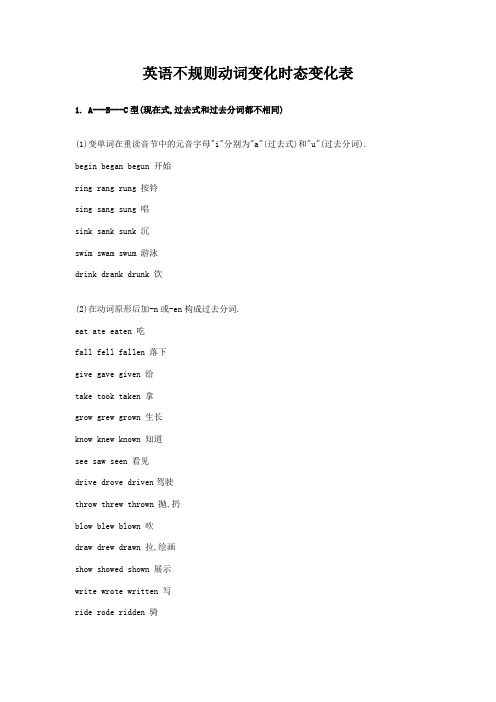
英语不规则动词变化时态变化表1. A---B---C型(现在式,过去式和过去分词都不相同)(1)变单词在重读音节中的元音字母"i"分别为"a"(过去式)和"u"(过去分词). begin began begun 开始ring rang rung 按铃sing sang sung 唱sink sank sunk 沉swim swam swum 游泳drink drank drunk 饮(2)在动词原形后加-n或-en构成过去分词.eat ate eaten 吃fall fell fallen 落下give gave given 给take took taken 拿grow grew grown 生长know knew known 知道see saw seen 看见drive drove driven驾驶throw threw thrown 抛,扔blow blew blown 吹draw drew drawn 拉,绘画show showed shown 展示write wrote written 写ride rode ridden 骑(3)过去式加-n或-en构成过去分词. speak spoke spoken 说话break broke broken 破碎,折断wake waked/ woke waked/ woken 醒choose chose chosen 选择forget forgot forgotten 忘记steal stole stolen 偷freeze froze frozen 冻结A ---B ---B型 (过去式和过去分词相同)(1)pay paid paid 付lay laid laid 下蛋say said said 说bring brought brought 带来buy bought bought 买think thought thought 想sleep slept slept 睡keep kept kept 保持sweep swept swept 扫stand stood stood 站understand understood understood 明白win won won 得胜shine shone/shined shone/shined 发光catch caught caught 抓住teach taught taught 教feel felt felt 觉得fight fought fought 战斗find found found 发现get got got 得到hang hanged/ hung hanged/ hung 绞死,挂have had had 有hold held held 盛,握leave left left 离开make made made 制造meet met met 遇见sell sold sold 卖shoot shot shot 射击tell told told 告诉smell smelt/smelled smelt/smelled 嗅,闻sit sat sat 坐dig dug dug 挖(2)在动词原形后加一个辅音字母d或t构成过去式或过去分词.burn burnt burnt 燃烧learn learned/learnt learned/learnt 学习mean meant meant 意思hear heard heard 听见(3)把动词原形的最后一个辅音字母"d"改为"t" 构成过去式或过去分词. build built built 建筑lend lent lent 借给lose lost lost 失去send sent sent 送spend spent spent 花费3. A---A---A型(现在式, 过去式和过去分词同形)cost cost cost 花费cut cut cut 割,切hit hit hit 打let let let 让put put put 放下read read read 读hurt hurt hurt 伤shut shut shut4. A---A---B型(现在式和过去式同形)beat beat beaten 打5. A---B---A型(现在式和过去分词同形)come came come 来become became become 变run ran run 跑6. 其他不规则动词的变化.be(am, is) was/ were been 是be(are) were been 是do did done 做go went gone 去lie lay lain 躺wear wore worn 穿fly flew flown 飞。
不规则动词变化表
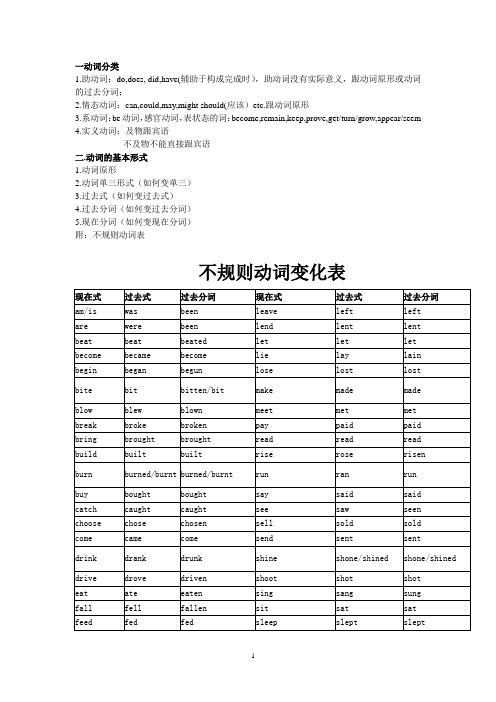
一动词分类1.助动词:do,does, did,have(辅助于构成完成时),助动词没有实际意义,跟动词原形或动词的过去分词;2.情态动词:can,could,may,might should(应该)etc.跟动词原形3.系动词:be动词,感官动词,表状态的词:become,remain,keep,prove,get/turn/grow,appear/seem4.实义动词:及物跟宾语不及物不能直接跟宾语二.动词的基本形式1.动词原形2.动词单三形式(如何变单三)3.过去式(如何变过去式)4.过去分词(如何变过去分词)5.现在分词(如何变现在分词)附:不规则动词表不规则动词变化表现在式过去式过去分词现在式过去式过去分词am/is was been leave left leftare were been lend lent lentbeat beat beated let let letbecome became become lie lay lainbegin began begun lose lost lostbite bit bitten/bit make made madeblow blew blown meet met metbreak broke broken pay paid paidbring brought brought read read readbuild built built rise rose risenburn burned/burnt burned/burnt run ran runbuy bought bought say said saidcatch caught caught see saw seenchoose chose chosen sell sold soldcome came come send sent sentdrink drank drunk shine shone/shined shone/shined drive drove driven shoot shot shoteat ate eaten sing sang sungfall fell fallen sit sat satfeed fed fed sleep slept sleptfeel felt felt smell smelt/smelled smelt/smelled fight fought fought speak spoke spokenfind found found spell spelt/spelled spelt/spelled fly flew flown spend spent spentforget forgot forgotten/forgot stand stood stoodforgive forgave forgiven steal stole stolenget got gotten/got sweep swept sweptgive gave given swim swam swumgo went gone swing swung swunggrow grew grown take took takenhang hung hung teach taught taughthear heard heard tear tore tornhit hit hit tell told toldhold held held think thought thoughthurt hurt hurt throw threw thrownkeep kept kept understand understood understood know knew known wear wore wornlay laid laid win won wonlead led led write wrote writtenlearn learned/learntlearned/learnt常用时态标志性词语:1.一般现在时always,usually,often,sometimes,hardly ever,never,every系列,once/twice a week/month/year,rarely,seldom,frequently2.一般过去时yesterday,the day before yesterday,last系列,ago系列,just now etc3.现在进行时now,listen,look,at the moment,these days,it's+点钟4.过去进行时this time yesterday, from 5 to 7 this time yesterday, when,while,as etc5.现在完成时already,yet,just,up to now,since,for+段时间,ever,never,so far,recently注意:have been tohave gone tohave been in区别6.过去完成时by the end of,从句的动作是一般过去时7一般将来时tomorrow,the day after tomorrow,next系列,in the future, in+段时间8.现在完成进行时for+段时间,since+点时间四.动词的语态主动语态:主语是动作的实施者被动语态:动作的承受者做主语被动语态构成:主语+be+done+(by+动作实施者:可省略)注意:be动词的单复数和时态问题主动语态变被动语态方法:宾变主主变by 想到构成往里带五动词的时态和语态习题Yesterday afternoon we ______(have) a car accident. We __________(drive) on the road about six o’clock.. It ________(rain) and________(be) very dark. We couldn’t see the road very well. I______(tell) John that he should drive slowly. Suddenly we _______(see) a car and _______(try) to stop, but his car________(hit) us. He__________(drive) so fast!2Last Monday I______(go) to have a talk on Korea. It was given by Miss Li. She_________(just return) the week before from a trip there. Miss Li_______(show) a film of her trip and_______(talk) about what she_______(see) there. She said that the Korean business men______(be) very much interested in the investment in China. She also said that she________(go) there again soon.3Last Sunday I_________(invite) to a dinner party and I_______(have) a wonderful time there. To my joy, I_______(meet) one of my friends. He_______(be) our monitor when we studied at the middle school. Now he _______(be) a professor at FudonUniversity. We________(not see) each other for years. He________(tell) me he________(go) th the United States in 1985. He said,”I_________(make) quite a few friends since then.4English_______(be) very widely_______(use). It________(speak) by people in England, the United States, Australia and many other countries. It______(be) one of the working languages at international meetings. Most international business letters_________(write) in English. And quite a few books and magazines_________(write) in English, too. If you ________(know) English, you________(find) you can ________(enjoy) so many more books. English________(be) really a bridge to so much knowledge.5It________(be) Friday morning. Tom________(open) his eyes quickly. The sun was shining. “What time_______(be) it now ?”He wanted________(know). He_______(look) at his watch.”seven thirty. It is too late.”He_______(get) up quickly,________(put) his books into his bag, and ran down to the door. “You didn’t_______(have) breakfast,Tom,” cried his monther. ”No, Mum, I’ll________(be) late for school if I can’t catch the bus,” said Tom.When Tom________(go) out of his house, the bus was coming near. He_______(run) very fast, and got on the bus. There________(be) lots of people sitting or standing on the bus. Then Tom_______(find) John, one of his good friends. Suddenly John looked back at Tom, and_______(cry) out, “Hello,Tom,_______ you ________(do) your English exercises last night?”Tom’s face________(turn) red, because everyone on the bus was looking at him. “Be quiet,”Tom said in an angry voice. “I_______(not do) them, but I don’t want anyone________(know) it.”6It________(be) one and a half years since I________(begin) to study English. I_______(be) glad to say that I_______(get) along quite well with it. One and a half years’study________(teach) me that we can’t________(learn) English well without________(work) hard. Now I_________(study) it very hard. I________(study) it even harder next year.7I_______(have) a leetter from my sister yesterday. She________(live) in Nigeria. In her letter, she said she________(come) to England next year. We are glad to have heard that.If she________(come), she________(get) a surprise. We________(be) now________(live) in a beautiful new house in the country. Work on the house had begun before my sister________(leave). It_________(complete) five months ago. The house________(have) many large rooms and there______(be) a lovely garden. It is a very modern house.。
常见不规则动词变化表
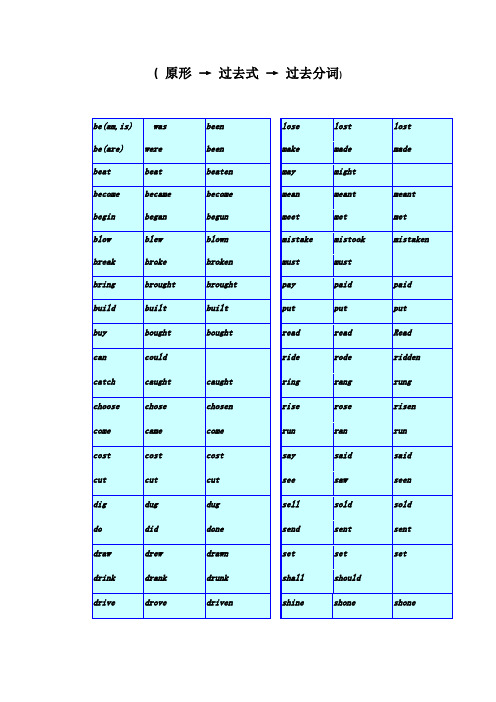
( 原形→过去式→过去分词)常见动词用法辨析(1)“Why not+动词原形+…?”(干嘛不……?)是简略句,完全形式是:Why don’t you+动词原形+…?如:Why not go and have a look?(干嘛不去看看?)/ Why not try it once again?(为什么不再试试?)(2) seem(好象)的用法:记住几个结构:①sb./sth. + seem + (to be+)形容词+…;②sb./sth. + seem + like +…;③sb/sth + seem + to (do);④It seems that+ 从句。
如:He seemed (to be) very happy when he was called by the headmaster.(被校长叫到名字时他好象很开心) / It seems that nobody else could do sucha foolish thing except Jim. (除了吉姆好象没有什么人会做出如此愚蠢的事情来)(3)be afraid(害怕)的用法:记住几个结构:①be afraid of sth; be afraid of (doing);②be afraid to (do); ③be afraid that+从句。
如:She is a little afraid ofsnakes.(她有点怕蛇)/ Don’t be so afraid to stay at home alone at night.(别害怕晚上一个人在家)/ I’m afraid that somebody will take his place because of his serious mistakes.(恐怕有人要取代他了,因为他犯了那么大的错误)(4) be sorry(抱歉)的用法:记住几个结构:①be sorry for (sth); ②be sorry for(doing sth); ③be sorry to (do); ④be sorry that+从句。
不规则动词时态变化表
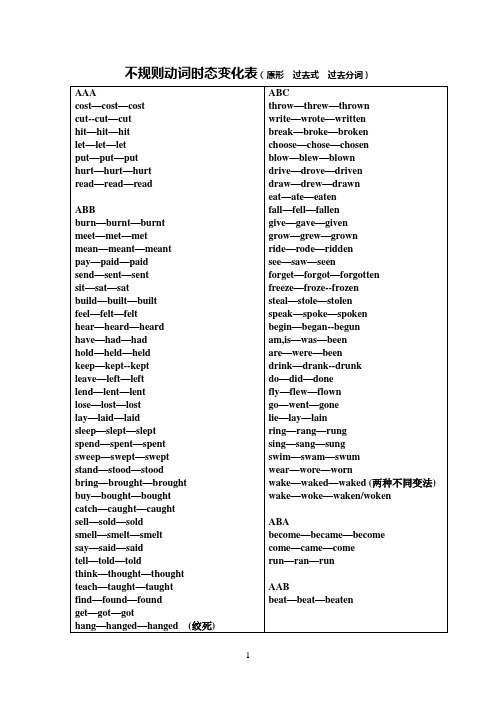
AAA
cost—cost—cost
cut--cut—cut
hit—hit—hit
let—let—let
put—put—put
hurt—hurt—hurt
read—read—read
ABB
burn—burnt—burnt
meet—met—met
mean—meant—meant
ABA
become—became—become
come—came—come
run—ran—run
AAB
beat—beat—beaten
lose—lost—lost
lay—laid—laid
sleep—slept—slept
spend—spent—spent
sweep—swept—swept
stand—stood—stood
bring—brought—brought
buy—bought—bought
catch—caught—camelt
say—said—said
tell—told—told
think—thought—thought
teach—taught—taught
find—found—found
get—got—got
hang—hanged—hanged(绞死)
hang—hung—hung (把…挂起)
ride—rode—ridden
see—saw—seen
forget—forgot—forgotten
freeze—froze--frozen
steal—stole—stolen
speak—spoke—spoken
英语不规则动词过去式和过去分词表
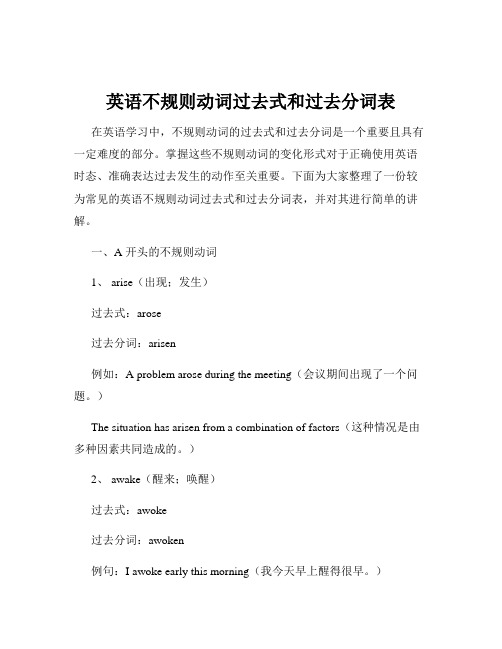
英语不规则动词过去式和过去分词表在英语学习中,不规则动词的过去式和过去分词是一个重要且具有一定难度的部分。
掌握这些不规则动词的变化形式对于正确使用英语时态、准确表达过去发生的动作至关重要。
下面为大家整理了一份较为常见的英语不规则动词过去式和过去分词表,并对其进行简单的讲解。
一、A 开头的不规则动词1、 arise(出现;发生)过去式:arose过去分词:arisen例如:A problem arose during the meeting(会议期间出现了一个问题。
)The situation has arisen from a combination of factors(这种情况是由多种因素共同造成的。
)2、 awake(醒来;唤醒)过去式:awoke过去分词:awoken例句:I awoke early this morning(我今天早上醒得很早。
)The noise awoke him(噪音把他吵醒了。
)二、B 开头的不规则动词1、 be(是;存在)过去式:was(第一、三人称单数)/were(第二人称单数和复数)过去分词:been例如:He was at home yesterday(他昨天在家。
)They were happy(他们很开心。
)I have been to Beijing twice(我去过北京两次。
)2、 bear(忍受;生育)过去式:bore过去分词:borne / born如:She couldn't bear the pain(她无法忍受疼痛。
)She has borne three children(她生了三个孩子。
)3、 beat(打败;拍打)过去式:beat过去分词:beaten“Our team beat theirs yesterday (我们队昨天打败了他们队。
)He has been beaten in the race (他在比赛中被打败了。
初中英语不规则动词过去式和过去分词表时态转化
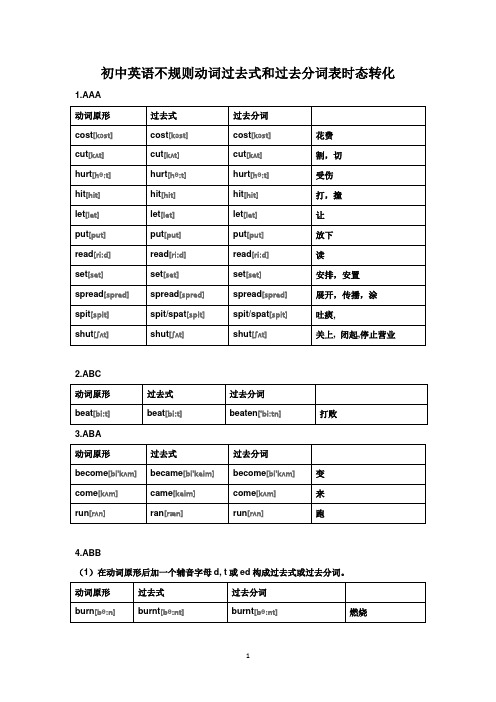
展示,给...看
smell[smel]
smelled/smelt[smelt]
smelled/smelt[smelt]
闻,嗅
speed[spi:d]
sped[sped]/speeded
sped/speeded[sped]
加速
spell[spel]
spelled/spelt[spelt]
打,撞
let[let]
let[let]
let[let]
让
put[put]
put[put]
put[put]
放下
read[ri:d]
read[ri:d]
read[ri:d]
读
set[set]
set[set]
set[set]
安排,安置
spread[spred]
spread[spred]
spread[spred]
过去分词
become[bi'kʌm]
became[bi'keim]
become[bi'kʌm]
变
come[kʌm]
came[keim]
come[kʌm]
来
run[rʌn]
ran[பைடு நூலகம்æn]
run[rʌn]
跑
4.ABB
(1)在动词原形后加一个辅音字母d, t或ed构成过去式或过去分词。
动词原形
过去式
过去分词
flown[fləun]
飞
go[ɡəu]
went[went]
gone[ɡɔn]
去
lie[lai]
lay[lei]
lain[lein]
